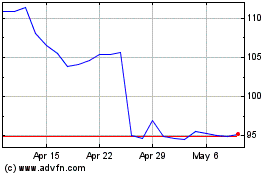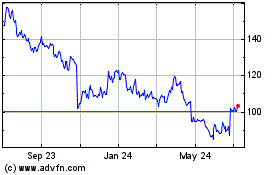From kitchen stoves to paper clips, U.S. antitrust enforcers are
putting the brakes on a series of corporate deals that have tested
the government's willingness to let longtime rivals combine two big
businesses.
On Monday, the Federal Trade Commission filed a lawsuit to block
Staples Inc.'s roughly $6 billion takeover of Office Depot Inc., a
deal that would create an office supplier with nearly $40 billion
in annual sales.
The lawsuit alleged the combination would mean higher prices for
companies that buy office supplies in bulk. Staples and Office
Depot said they would contest the suit, but shares of both
companies tumbled.
The FTC's unanimous decision came the same day that General
Electric Co. abandoned a $3.3 billion agreement to sell its
appliances business to Electrolux AB of Sweden. GE walked away from
the deal, which it struck 15 months ago, in the middle of a
courtroom fight with the U.S. Department of Justice.
Once again, government lawyers argued the combination would
reduce competition and raise prices. Shares of Electrolux, whose
CEO had testified the deal was "absolutely critical" to its
business, lost 15% of their value, while GE shares slipped less
than 1%.
Both transactions would have left bigger companies atop
industries that have been consolidating for years. Adding Office
Depot, which merged with OfficeMax in 2013, would leave Staples
with 70% of the market for pens, pads and office essentials that
large businesses buy directly, according to the FTC. Combining GE
and Electrolux would have created a merged firm that sold two of
every three cooking ranges in the U.S., government lawyers
said.
"Each horizontal merger raises concentration. And when market
concentration goes up, the likelihood that the next merger will be
challenged goes up as well," said University of Iowa law professor
Herbert Hovenkamp. "The government has been on a decent roll in
merger cases the last couple of years. These are both good examples
of that."
Cheap debt and a slow-growth economy has helped fuel a record
year for mergers and acquisitions—with $4.35 trillion in global
volume and $2.12 trillion in U.S. deals, according to Dealogic. But
it has also been a banner year for transactions that have fallen at
the hands of antitrust police appointed by President Barack
Obama.
Antitrust objections by the Justice Department earlier this year
helped derail Comcast Corp.'s $45 billion bid for Time Warner Cable
Inc. The FTC won a court fight in June that blocked the $3.5
billion combination of food-distribution rivals Sysco Corp. and US
Foods Inc. Last week, two leading tuna producers—the owners of
Bumble Bee and Chicken of the Sea brands— called off a $1.5 billion
merger in light of U.S. concerns.
The agencies this year have sought to stop deals in an array of
other markets, including movie advertising networks, hospitals and
the semiconductor industry. So far this year, Dealogic says
companies have abandoned 77 deals worth $263 billion, though that
tally includes many deals withdrawn for nonregulatory reasons.
All four current FTC commissioners, three Democrats and a
Republican, voted in favor of the Staples lawsuit. Market expansion
or new entry by other office-supply vendors wouldn't be timely,
likely or sufficient to counter the anticompetitive effects of the
merger, the FTC said. Shares of Office Depot fell 16% Monday, while
Staples lost 14%.
The companies said the decision was "based on a flawed analysis
and misunderstanding of the intense competitive landscape." The
lawsuit marks the second time the FTC has intervened to prevent the
two companies from combining. The commission in 1997 won a ruling
from a federal judge that blocked a Staples-Office Depot
merger.
Both companies argued the industry has evolved over the past two
decades, including through growing competition from the Internet
and big-box retailers. The FTC acknowledged this evolution when it
allowed Office Depot to merge with OfficeMax.
"The FTC now contradicts its prior ruling, even though
competition has materially intensified in the two years since the
commission declared this market highly competitive," the companies
wrote in a letter to clients. "This contradiction is not only
unfair; it flies in the face of marketplace realities."
The FTC said business-to-business market is distinct from the
more competitive retail markets for office supplies sold to
consumers.
The companies had sought to ease FTC concerns by offering to
shed hundreds of millions of dollars in corporate contracts. FTC
staffers weren't enthusiastic about the divestiture offer, and the
companies in recent days had offered larger concessions, according
to people familiar with the matter.
Both Staples and Electrolux asked the government to take a
broader view of markets and give credit to newer, smaller
competitors.
The GE transaction was in jeopardy since the summer, when the
Justice Department filed a lawsuit to block it.
"This deal was bad for the millions of consumers who buy cooking
appliances every year. Electrolux and General Electric could not
overcome that reality at trial," Justice Department lawyer David
Gelfand said Monday.
The companies pointed to the Bush Justice Department's decision
in 2006 to allow Whirlpool Corp. to acquire rival Maytag Corp.
Top executives from Electrolux and GE had testified during the
trial, which began in early November. Though the court handling the
case had yet to render a verdict, GE used its right to terminate
the sale after 15 months of talks, which was its first opportunity
to walk away from the transaction and collect a breakup fee.
GE said Monday it is entitled to a $175 million breakup fee.
Electrolux, though, said it was reviewing the terms of the fee.
"The appliances business is performing well and GE will continue
to run the business while it pursues a sale," GE said. The deal's
failure is a setback to the company's effort to focus on high-tech
industrial industries but GE has been confident it could find
another buyer if the Electrolux deal fell through, according to
people familiar with the company's thinking.
Electrolux had hoped to create an appliances seller capable of
competing with the behemoth of Whirlpool and rising Asian
competitors. "We are disappointed but we are certainly not
defeated," Electrolux CEO Keith McLoughlin said during a conference
call.
The merged Electrolux-GE business would have had about
one-quarter of the U.S. market last year, compared with roughly 30%
for Whirlpool, and 12% and 13%, respectively, for South Korean
rivals LG Corp. and Samsung Electronics Co., according to data from
TraQline.
Jens Hansegard contributed to this article.
Write to Brent Kendall at brent.kendall@wsj.com, Drew FitzGerald
at andrew.fitzgerald@wsj.com and Ted Mann at ted.mann@wsj.com
(END) Dow Jones Newswires
December 07, 2015 20:55 ET (01:55 GMT)
Copyright (c) 2015 Dow Jones & Company, Inc.
Whirlpool (NYSE:WHR)
Historical Stock Chart
From Mar 2024 to Apr 2024

Whirlpool (NYSE:WHR)
Historical Stock Chart
From Apr 2023 to Apr 2024
